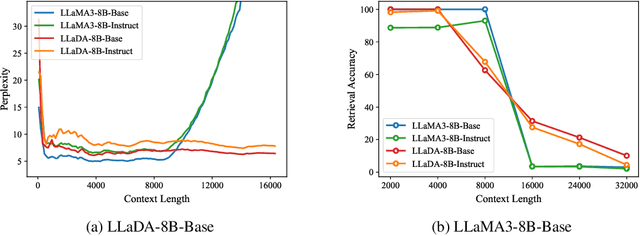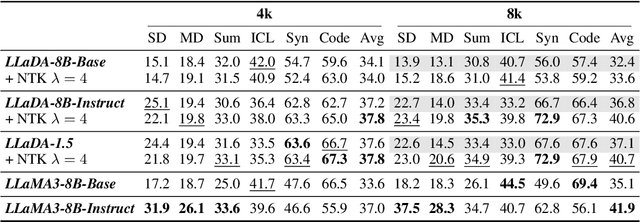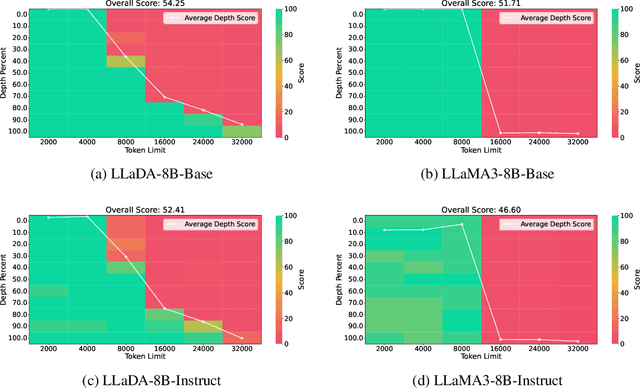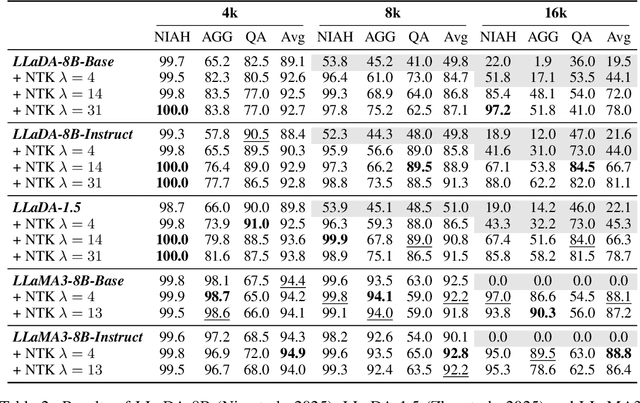Zhigeng Liu
Beyond Real: Imaginary Extension of Rotary Position Embeddings for Long-Context LLMs
Dec 08, 2025Abstract:Rotary Position Embeddings (RoPE) have become a standard for encoding sequence order in Large Language Models (LLMs) by applying rotations to query and key vectors in the complex plane. Standard implementations, however, utilize only the real component of the complex-valued dot product for attention score calculation. This simplification discards the imaginary component, which contains valuable phase information, leading to a potential loss of relational details crucial for modeling long-context dependencies. In this paper, we propose an extension that re-incorporates this discarded imaginary component. Our method leverages the full complex-valued representation to create a dual-component attention score. We theoretically and empirically demonstrate that this approach enhances the modeling of long-context dependencies by preserving more positional information. Furthermore, evaluations on a suite of long-context language modeling benchmarks show that our method consistently improves performance over the standard RoPE, with the benefits becoming more significant as context length increases. The code is available at https://github.com/OpenMOSS/rope_pp.
LongLLaDA: Unlocking Long Context Capabilities in Diffusion LLMs
Jun 17, 2025



Abstract:Large Language Diffusion Models, or diffusion LLMs, have emerged as a significant focus in NLP research, with substantial effort directed toward understanding their scalability and downstream task performance. However, their long-context capabilities remain unexplored, lacking systematic analysis or methods for context extension. In this work, we present the first systematic investigation comparing the long-context performance of diffusion LLMs and traditional auto-regressive LLMs. We first identify a unique characteristic of diffusion LLMs, unlike auto-regressive LLMs, they maintain remarkably \textbf{\textit{stable perplexity}} during direct context extrapolation. Furthermore, where auto-regressive models fail outright during the Needle-In-A-Haystack task with context exceeding their pretrained length, we discover diffusion LLMs exhibit a distinct \textbf{\textit{local perception}} phenomenon, enabling successful retrieval from recent context segments. We explain both phenomena through the lens of Rotary Position Embedding (RoPE) scaling theory. Building on these observations, we propose LongLLaDA, a training-free method that integrates LLaDA with the NTK-based RoPE extrapolation. Our results validate that established extrapolation scaling laws remain effective for extending the context windows of diffusion LLMs. Furthermore, we identify long-context tasks where diffusion LLMs outperform auto-regressive LLMs and others where they fall short. Consequently, this study establishes the first context extrapolation method for diffusion LLMs while providing essential theoretical insights and empirical benchmarks critical for advancing future research on long-context diffusion LLMs.
Beyond Homogeneous Attention: Memory-Efficient LLMs via Fourier-Approximated KV Cache
Jun 13, 2025Abstract:Large Language Models struggle with memory demands from the growing Key-Value (KV) cache as context lengths increase. Existing compression methods homogenize head dimensions or rely on attention-guided token pruning, often sacrificing accuracy or introducing computational overhead. We propose FourierAttention, a training-free framework that exploits the heterogeneous roles of transformer head dimensions: lower dimensions prioritize local context, while upper ones capture long-range dependencies. By projecting the long-context-insensitive dimensions onto orthogonal Fourier bases, FourierAttention approximates their temporal evolution with fixed-length spectral coefficients. Evaluations on LLaMA models show that FourierAttention achieves the best long-context accuracy on LongBench and Needle-In-A-Haystack (NIAH). Besides, a custom Triton kernel, FlashFourierAttention, is designed to optimize memory via streamlined read-write operations, enabling efficient deployment without performance compromise.
Thus Spake Long-Context Large Language Model
Feb 24, 2025Abstract:Long context is an important topic in Natural Language Processing (NLP), running through the development of NLP architectures, and offers immense opportunities for Large Language Models (LLMs) giving LLMs the lifelong learning potential akin to humans. Unfortunately, the pursuit of a long context is accompanied by numerous obstacles. Nevertheless, long context remains a core competitive advantage for LLMs. In the past two years, the context length of LLMs has achieved a breakthrough extension to millions of tokens. Moreover, the research on long-context LLMs has expanded from length extrapolation to a comprehensive focus on architecture, infrastructure, training, and evaluation technologies. Inspired by the symphonic poem, Thus Spake Zarathustra, we draw an analogy between the journey of extending the context of LLM and the attempts of humans to transcend its mortality. In this survey, We will illustrate how LLM struggles between the tremendous need for a longer context and its equal need to accept the fact that it is ultimately finite. To achieve this, we give a global picture of the lifecycle of long-context LLMs from four perspectives: architecture, infrastructure, training, and evaluation, showcasing the full spectrum of long-context technologies. At the end of this survey, we will present 10 unanswered questions currently faced by long-context LLMs. We hope this survey can serve as a systematic introduction to the research on long-context LLMs.
Farewell to Length Extrapolation, a Training-Free Infinite Context with Finite Attention Scope
Jul 21, 2024



Abstract:The maximum supported context length is a critical bottleneck limiting the practical application of the Large Language Model (LLM). Although existing length extrapolation methods can extend the context of LLMs to millions of tokens, these methods all have an explicit upper bound. In this work, we propose LongCache, a training-free approach that enables LLM to support an infinite context with finite context scope, through full-context cache selection and training-free integration. This effectively frees LLMs from the length extrapolation issue. We validate LongCache on the LongBench and L-Eval and demonstrate its performance is on par with traditional full-attention mechanisms. Furthermore, we have applied LongCache on mainstream LLMs, including LLaMA3 and Mistral-v0.3, enabling them to support context lengths of at least 400K in Needle-In-A-Haystack tests. We will improve the efficiency of LongCache by GPU-aware optimization soon.
AnyGPT: Unified Multimodal LLM with Discrete Sequence Modeling
Feb 26, 2024



Abstract:We introduce AnyGPT, an any-to-any multimodal language model that utilizes discrete representations for the unified processing of various modalities, including speech, text, images, and music. AnyGPT can be trained stably without any alterations to the current large language model (LLM) architecture or training paradigms. Instead, it relies exclusively on data-level preprocessing, facilitating the seamless integration of new modalities into LLMs, akin to the incorporation of new languages. We build a multimodal text-centric dataset for multimodal alignment pre-training. Utilizing generative models, we synthesize the first large-scale any-to-any multimodal instruction dataset. It consists of 108k samples of multi-turn conversations that intricately interweave various modalities, thus equipping the model to handle arbitrary combinations of multimodal inputs and outputs. Experimental results demonstrate that AnyGPT is capable of facilitating any-to-any multimodal conversation while achieving performance comparable to specialized models across all modalities, proving that discrete representations can effectively and conveniently unify multiple modalities within a language model. Demos are shown in https://junzhan2000.github.io/AnyGPT.github.io/
 Add to Chrome
Add to Chrome Add to Firefox
Add to Firefox Add to Edge
Add to Edge